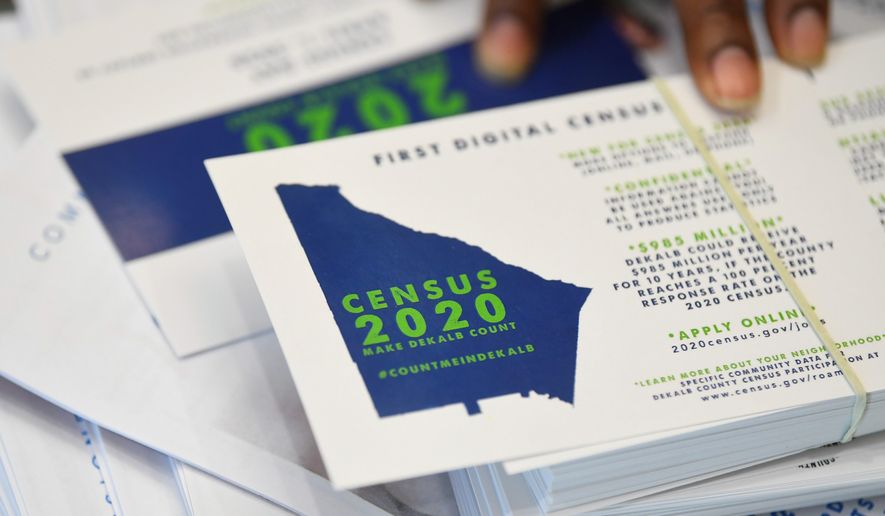The groans must have been audible at the Census Bureau two years ago when then-Attorney General Jeff Sessions, testifying to Congress, told Americans they could skip any questions they don’t like.
Not only is that bad for the data, but it’s also bad legal advice, say census analysts and the bureau itself.
Yet as the 2020 count gets underway, millions of Americans will grapple with whether to respond or not, and if they do, how much they want to reveal to the government.
Mr. Sessions testified amid a fight over President Trump’s push to add a question about citizenship to the nine other basic questions on the 2020 form. The attorney general suggested people were making too big a deal of it.
“It shouldn’t scare people. They don’t have to answer it, really,” said Mr. Sessions, who months later was ousted from his job.
The Justice Department, now under Attorney General William P. Barr, didn’t respond to a request asking whether it still stands by Mr. Sessions’ legal reading — but the Census Bureau certainly does not.
“The Census Bureau’s role is to conduct a complete and accurate count of the entire nation — as directed by law. To communicate anything less than the importance of every question would undermine our legal mandate to conduct a complete and accurate count,” the bureau told The Washington Times. “We highly encourage people to fill out the census as completely and accurately as possible.”
Indeed, failing to respond, or willfully giving bogus answers, could result in a $5,000 penalty, though the bureau is quick to point out that it’s not a prosecuting agency and what it really wants is data, not headlines from a court fight.
The last prosecution stemmed from the 1970 census, when an anti-census activist was convicted and received a $50 fine. The ruling was overturned on appeal.
Yet anguish about the intrusiveness of the census has existed on both sides of the political spectrum.
In 2010, it was the tea-party-infused right, worried about what the Obama administration might do.
Then-Rep. Michele Bachmann made waves with her announcement that she would fill out only the number of people in her household and refuse the rest of the questions. She said that was all the Constitution required. Fact-checkers excoriated her for that claim.
This time, it has been liberals, furious over President Trump’s desire to ask about citizenship on the 2020 count, who were speculating about boycotting that question.
Mr. Trump abandoned his plan after an adverse ruling from the Supreme Court in June and under time pressure to finalize the questionnaire.
One group that has been consistent in warning about census overreach is the Libertarian Party, which issued statements last time and this time.
Daniel Fishman, the party’s executive director, said he will answer how many people are at his residence but will be wary of giving other details.
“I will choose voluntarily which questions I think are appropriate to answer,” he told The Times. “Most of the things I’m going to look at I’m going to gauge with an idea of how does me answering this question help to protect civil liberties.”
Mr. Fishman said the government has a legitimate interest in knowing how many people are in each home, but he added that he would have declined to answer the citizenship question and ruled out answers about race or ethnicity.
Census officials say they have ways of dealing with partial answers.
Workers may follow up with calls or visits to try to get the information. They may also use other administrative records or “statistical methodology” to figure out the right answers for people who don’t comply.
Each home that requires a follow-up costs an average of $28, the bureau said.
Mr. Fishman said it’s not going to change his mind about his answers. “I would rather not be complicit,” he said.
“There is a point that if enough people don’t answer it, they don’t have a good statistical model,” he said.
The Census Bureau will mail out forms in March, and the census day is slated for April 1. Some households will also receive what is known as the American Community Survey, a far more detailed questionnaire sent to a fraction of homes each year that asks about educational attainment, computer use, fertility and other matters. The ACS also asks about citizenship.
The ACS is also considered a mandatory survey, said Terri Ann Lowenthal, who has years of experience at the congressional and presidential level working on census matters.
“It’s important to be counted, and so you should do your best. Drop the mic, full stop,” Ms. Lowenthal said. “You can’t say to people it’s OK not to answer the question.”
By some estimates, more than $1 trillion in government assistance at the federal, state and local level is doled out each year based on the answers, and businesses make investment decisions from the information, too.
A good count is also critical to ensuring people have the amount of political power to which they are entitled. Ducking the census means that when the time comes to draw congressional or state legislative districts, more people end up packed into some seats — effectively diluting the say of each voter.
Election officials also use census data to enforce the Voting Rights Act, making sure minorities have adequate representation and access to the ballot, such as information available in other languages in communities where census numbers show they are numerous enough.
“The census is the cornerstone, the foundation, of our representative democracy. That is why it is the very first responsibility of the government in the U.S. Constitution,” Ms. Lowenthal said. “The census is the predicate for trying to ensure that one’s vote meets the constitutional requirements for equitable voices in our political system.”
• Stephen Dinan can be reached at sdinan@washingtontimes.com.




Please read our comment policy before commenting.